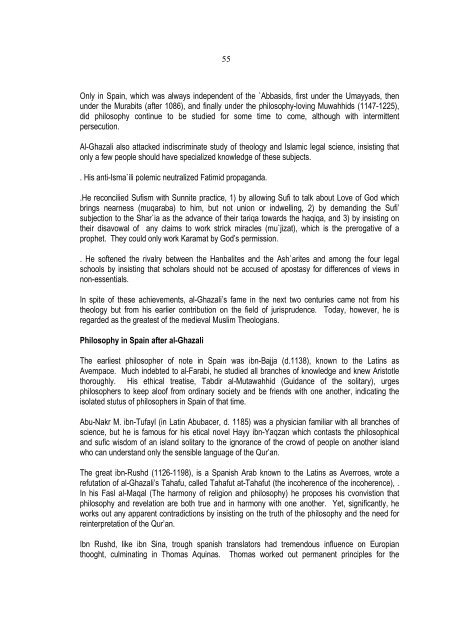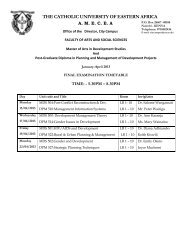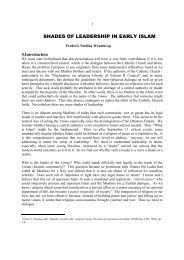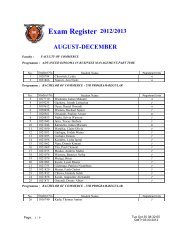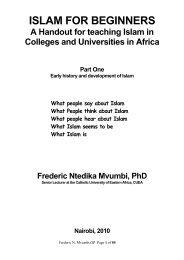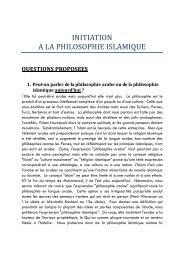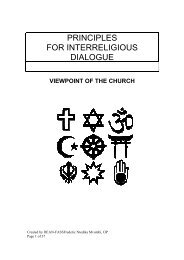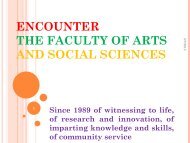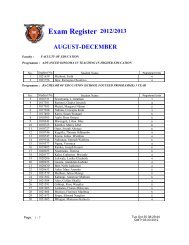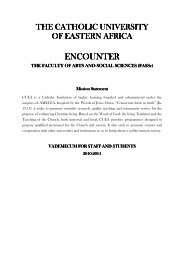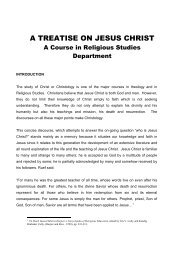54prophesy of the future etc.) Al-baqilani saw its superior literary quality as the aspect, which defiesimitation.On the same question, al-Isfara`ini held that the Qur’an was miraculous only because Godobstructed any attempt at imitation, not that it is inimitable in itself.Al-Juwayni (d.1085) was another important Ash`arite who lived in Nishapur in Seljuq period. Hehad to go into exile to Makka and Madina— hence gaining the name imam al-haramayn (Imam ofthe two shrines). With the accession of Alp-Arslan to the Seljuq throne, the famous Nizamalmukwas appointed Wazir. The numerous Nizamiyya schools he founded were centers of ash`arism,and to head the one in Nishapur he called al-Juwayni back from exile. Al-Juwayni was atheologian in his won right, but is known chiefly as the teacher of al-Ghazali.Al-GhazaliAt the age of 19 Abu-hamid Muhammad al-Ghazali began to study under al-Juwayni at Nishapur,mastering all branches of legal and theological studies. When his master died in 1085, he joindedthe scholars surrounding Nizamalmuk. His good performance in debates won him an appointmentas chief professor at the Nizamiyya College in Bagdad in 1091, at the age of 33. He lectured onJurisprudence to classes op to 300 students. In the meantime he set himself to reading the worksof al-Farabi and ibn-Sina, and wrote a polemical aatck on their views in his Tahafut al-Falasifa(Incoherence of the philosophers).Psychological tensions, together with fear of hell fire, came to his crisis in 1096, producing aspeech impediment which prevented him from lecturing. He then decided to make a pilgrimage toMakka, but spent a year of retreat in Damascus and Jerusalem before doing so. Back in his hometown of Tus, he adopted a kind of monastic sufi life together with some young disciples. Heregained his health and peace of mind and in 1106, the beginning of the 6 th Islamic century, he wasurged by his friends, including the son of Nizamalmuk, to return to teaching. They were convincedhe was the Mujadid (renewer of religion) expected by Tradition at the beginning of each century.Back at Nishapur he taught until 1110, the year before his death.Al-Ghazali autobiography, al-Munqidl min ad-dalal (deliverance from error), tells how in his crisis hesought relief from his scepticism by testing the various movements of his time: philosophicaltheology (Kalam), philosophy, Batiniyya (Isma`ili Shi`ism), and Sufism, He discovered that onlySufism could and did deliver him from his breakdown and restore him to health.The fullest exposition of al-Ghazali’s thought is in his legtly Ihaya’ulum ad-din (revival of religioussciences), a kind of Summa theologiae. In this and many other works he developed Ash`aritetheology and made a lasting impact in several areas:. Many new philosophical elements were absorbed into theology, particulrly most of Aristoltelialsyllogistic logic. The result was an enrichment of systematic theology.. He helped kill philosophy as an autonomous study, at the least in the East. In spite of his ownexposure to philosophy, al-Ghazali was the view that, of its branches, medicine, arithmetic andsome other basic skills should be learned by a few individuals who would serve the community(fard al-kifaya). Logic and metaphysical study of God (as done by Aristotle) was absorbed intotheology. Natural science was considered either false (as astrology or magic or any recognition ofnature and causality in the world) or useless (detailed knowledge of physical universe).
55Only in Spain, which was always independent of the `Abbasids, first under the Umayyads, thenunder the Murabits (after 1086), and finally under the philosophy-loving Muwahhids (1147-1225),did philosophy continue to be studied for some time to come, although with intermittentpersecution.Al-Ghazali also attacked indiscriminate study of theology and Islamic legal science, insisting thatonly a few people should have specialized knowledge of these subjects.. His anti-Isma`ili polemic neutralized Fatimid propaganda..He reconcilied Sufism with Sunnite practice, 1) by allowing Sufi to talk about Love of God whichbrings nearness (muqaraba) to him, but not union or indwelling, 2) by demanding the Sufi’subjection to the Shar`ia as the advance of their tariqa towards the haqiqa, and 3) by insisting ontheir disavowal of any claims to work strick miracles (mu`jizat), which is the prerogative of aprophet. They could only work Karamat by God’s permission.. He softened the rivalry between the Hanbalites and the Ash`arites and among the four legalschools by insisting that scholars should not be accused of apostasy for differences of views innon-essentials.In spite of these achievements, al-Ghazali’s fame in the next two centuries came not from histheology but from his earlier contribution on the field of jurisprudence. Today, however, he isregarded as the greatest of the medieval Muslim Theologians.Philosophy in Spain after al-GhazaliThe earliest philosopher of note in Spain was ibn-Bajja (d.1138), known to the Latins asAvempace. Much indebted to al-Farabi, he studied all branches of knowledge and knew Aristotlethoroughly. His ethical treatise, Tabdir al-Mutawahhid (Guidance of the solitary), urgesphilosophers to keep aloof from ordinary society and be friends with one another, indicating theisolated stutus of philosophers in Spain of that time.Abu-Nakr M. ibn-Tufayl (in Latin Abubacer, d. 1185) was a physician familiar with all branches ofscience, but he is famous for his etical novel Hayy ibn-Yaqzan which contasts the philosophicaland sufic wisdom of an island solitary to the ignorance of the crowd of people on another islandwho can understand only the sensible language of the Qur’an.The great ibn-Rushd (1126-1198), is a Spanish Arab known to the Latins as Averroes, wrote arefutation of al-Ghazali’s Tahafu, called Tahafut at-Tahafut (the incoherence of the incoherence), .In his Fasl al-Maqal (The harmony of religion and philosophy) he proposes his cvonvistion thatphilosophy and revelation are both true and in harmony with one another. Yet, significantly, heworks out any apparent contradictions by insisting on the truth of the philosophy and the need forreinterpretation of the Qur’an.Ibn Rushd, like ibn Sina, trough spanish translators had tremendous influence on Europianthooght, culminating in Thomas Aquinas. Thomas worked out permanent principles for the


